University Accounting: Professional Ethics and Code of Conduct
VerifiedAdded on 2023/02/01
|7
|1208
|56
Report
AI Summary
This report explores professional ethics in the field of accounting, examining the rationale behind the code of conduct adopted by the AICPA. It outlines the purpose of the code, emphasizing its role in ensuring members serve client interests with technical competency, diligence, and integrity. The report details key components of the code, such as acting in the public interest, maintaining independence and objectivity, adhering to standards of due care, upholding data standards, and demonstrating integrity. Furthermore, it defines the responsibilities of various accounting professionals, including auditors, financial statement preparers, tax professionals, and other accountants like audit committee members, providing a comprehensive overview of ethical considerations and professional conduct within the accounting profession. The report references key sources to support its findings.
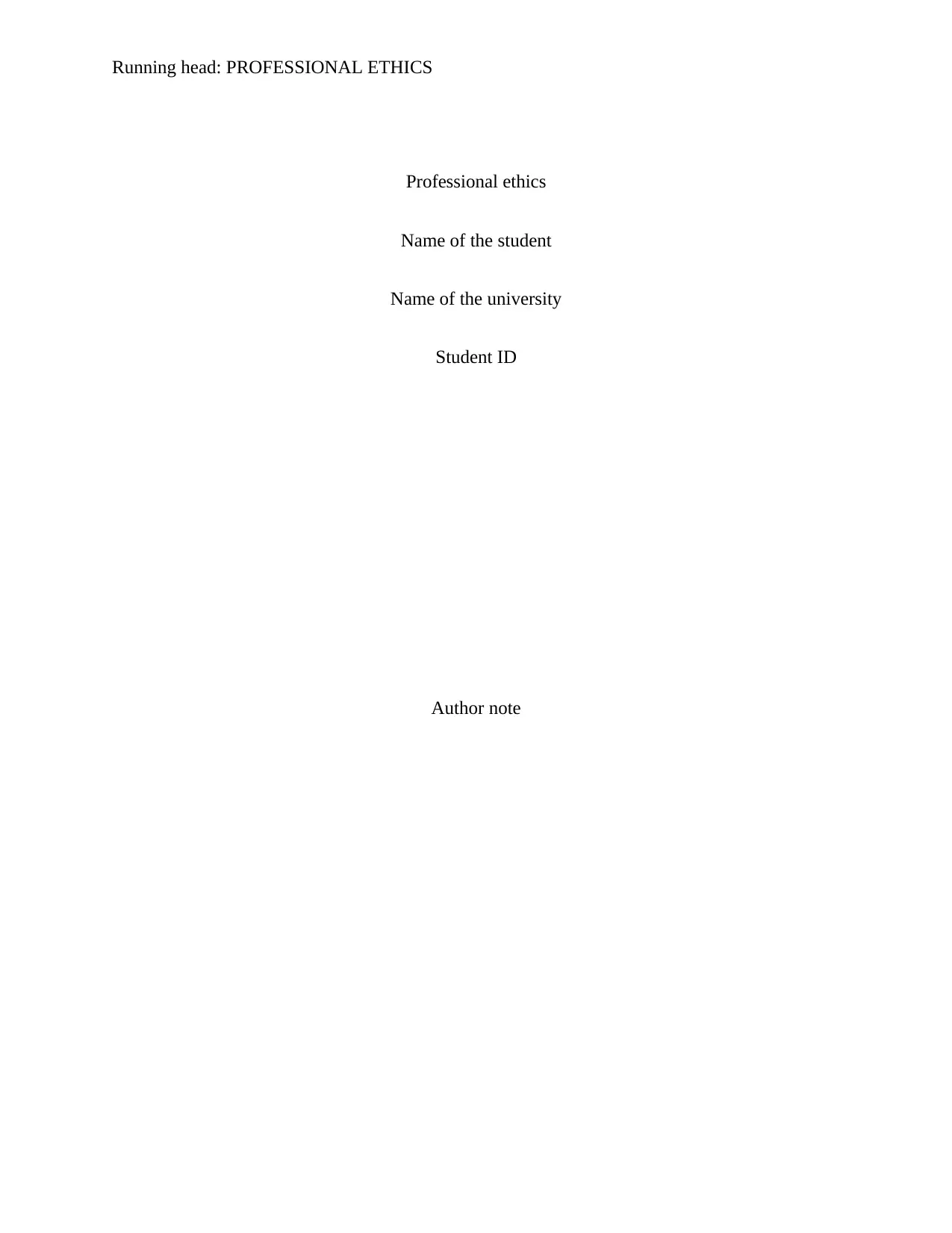
Running head: PROFESSIONAL ETHICS
Professional ethics
Name of the student
Name of the university
Student ID
Author note
Professional ethics
Name of the student
Name of the university
Student ID
Author note
Paraphrase This Document
Need a fresh take? Get an instant paraphrase of this document with our AI Paraphraser
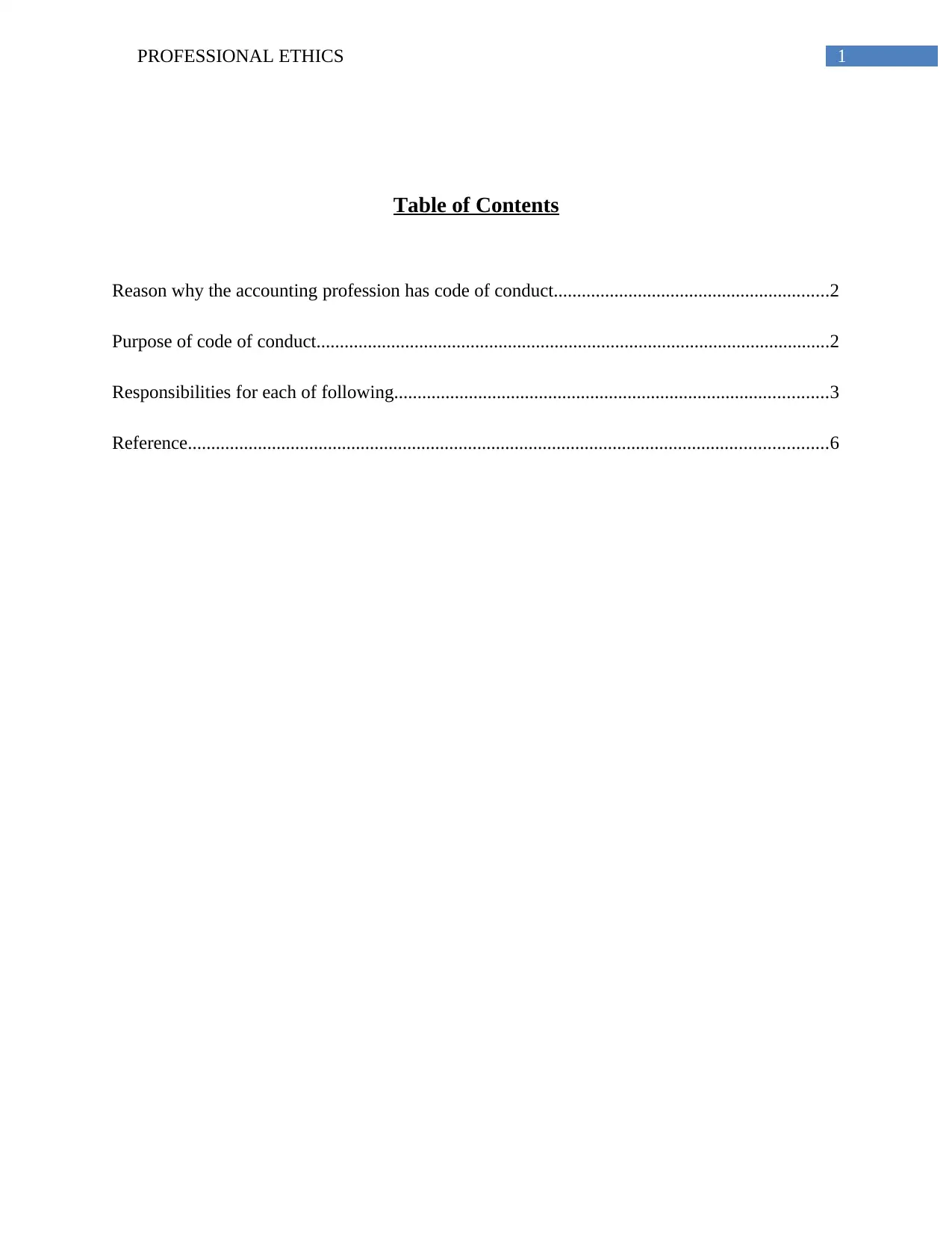
1PROFESSIONAL ETHICS
Table of Contents
Reason why the accounting profession has code of conduct...........................................................2
Purpose of code of conduct..............................................................................................................2
Responsibilities for each of following.............................................................................................3
Reference.........................................................................................................................................6
Table of Contents
Reason why the accounting profession has code of conduct...........................................................2
Purpose of code of conduct..............................................................................................................2
Responsibilities for each of following.............................................................................................3
Reference.........................................................................................................................................6
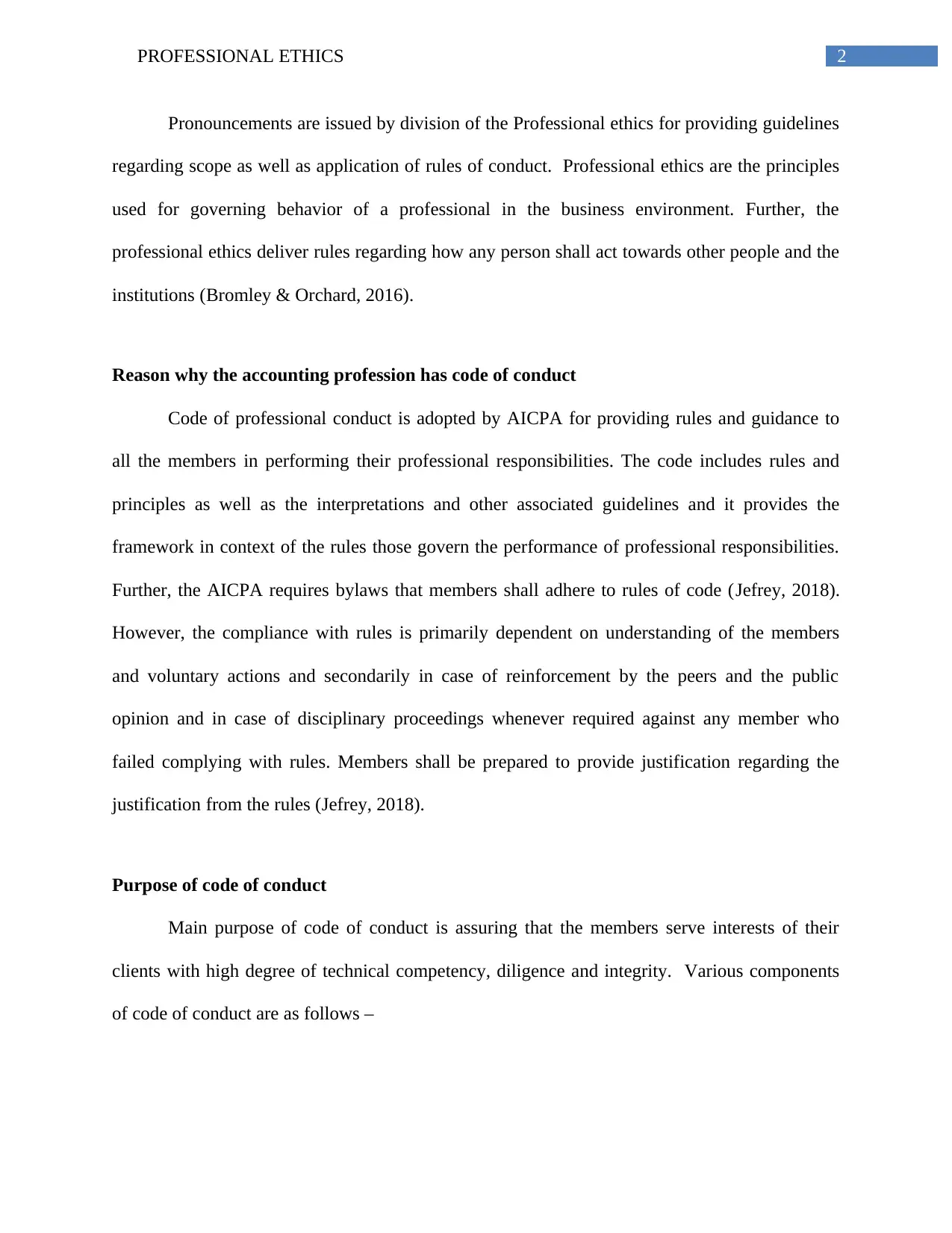
2PROFESSIONAL ETHICS
Pronouncements are issued by division of the Professional ethics for providing guidelines
regarding scope as well as application of rules of conduct. Professional ethics are the principles
used for governing behavior of a professional in the business environment. Further, the
professional ethics deliver rules regarding how any person shall act towards other people and the
institutions (Bromley & Orchard, 2016).
Reason why the accounting profession has code of conduct
Code of professional conduct is adopted by AICPA for providing rules and guidance to
all the members in performing their professional responsibilities. The code includes rules and
principles as well as the interpretations and other associated guidelines and it provides the
framework in context of the rules those govern the performance of professional responsibilities.
Further, the AICPA requires bylaws that members shall adhere to rules of code (Jefrey, 2018).
However, the compliance with rules is primarily dependent on understanding of the members
and voluntary actions and secondarily in case of reinforcement by the peers and the public
opinion and in case of disciplinary proceedings whenever required against any member who
failed complying with rules. Members shall be prepared to provide justification regarding the
justification from the rules (Jefrey, 2018).
Purpose of code of conduct
Main purpose of code of conduct is assuring that the members serve interests of their
clients with high degree of technical competency, diligence and integrity. Various components
of code of conduct are as follows –
Pronouncements are issued by division of the Professional ethics for providing guidelines
regarding scope as well as application of rules of conduct. Professional ethics are the principles
used for governing behavior of a professional in the business environment. Further, the
professional ethics deliver rules regarding how any person shall act towards other people and the
institutions (Bromley & Orchard, 2016).
Reason why the accounting profession has code of conduct
Code of professional conduct is adopted by AICPA for providing rules and guidance to
all the members in performing their professional responsibilities. The code includes rules and
principles as well as the interpretations and other associated guidelines and it provides the
framework in context of the rules those govern the performance of professional responsibilities.
Further, the AICPA requires bylaws that members shall adhere to rules of code (Jefrey, 2018).
However, the compliance with rules is primarily dependent on understanding of the members
and voluntary actions and secondarily in case of reinforcement by the peers and the public
opinion and in case of disciplinary proceedings whenever required against any member who
failed complying with rules. Members shall be prepared to provide justification regarding the
justification from the rules (Jefrey, 2018).
Purpose of code of conduct
Main purpose of code of conduct is assuring that the members serve interests of their
clients with high degree of technical competency, diligence and integrity. Various components
of code of conduct are as follows –
⊘ This is a preview!⊘
Do you want full access?
Subscribe today to unlock all pages.

Trusted by 1+ million students worldwide
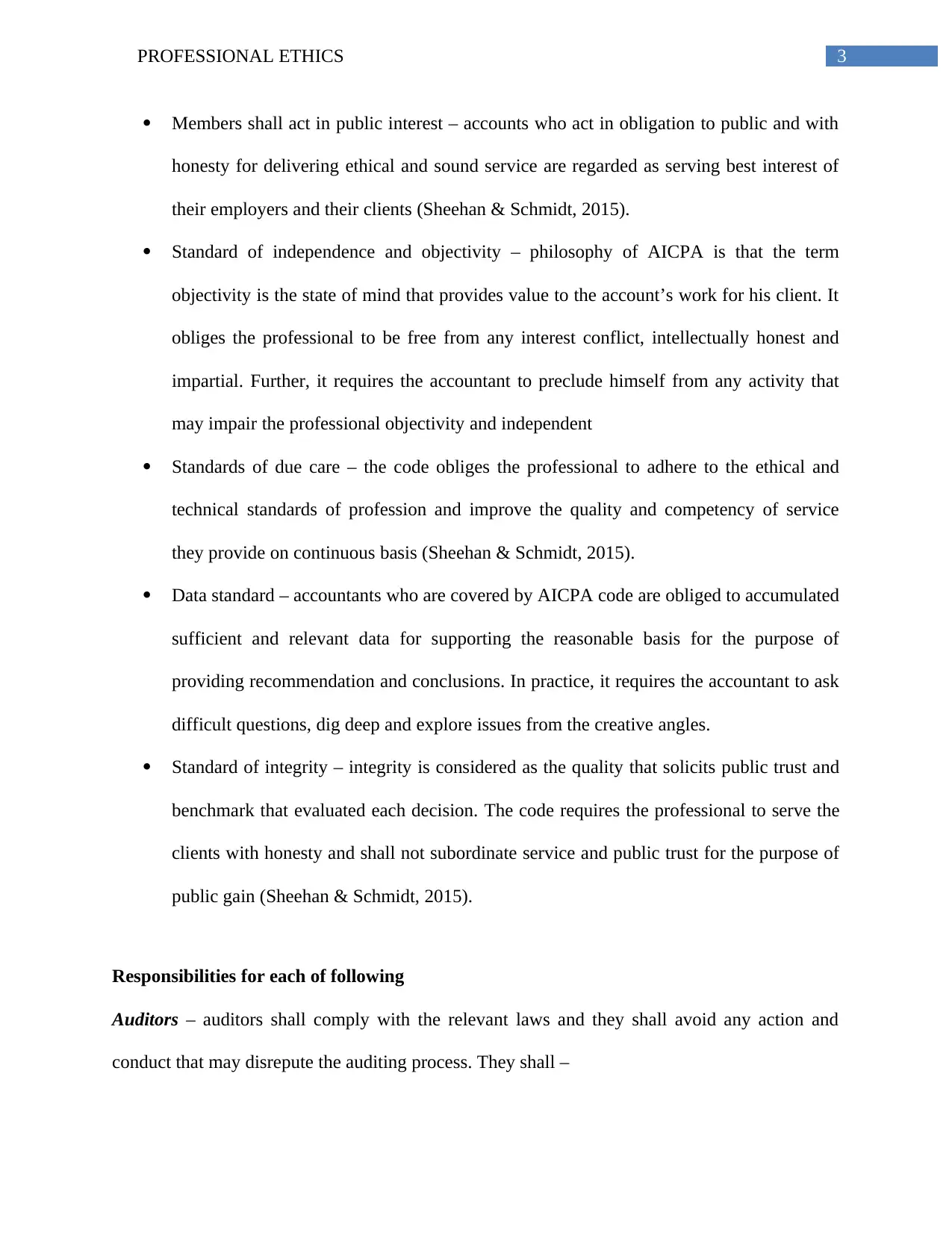
3PROFESSIONAL ETHICS
Members shall act in public interest – accounts who act in obligation to public and with
honesty for delivering ethical and sound service are regarded as serving best interest of
their employers and their clients (Sheehan & Schmidt, 2015).
Standard of independence and objectivity – philosophy of AICPA is that the term
objectivity is the state of mind that provides value to the account’s work for his client. It
obliges the professional to be free from any interest conflict, intellectually honest and
impartial. Further, it requires the accountant to preclude himself from any activity that
may impair the professional objectivity and independent
Standards of due care – the code obliges the professional to adhere to the ethical and
technical standards of profession and improve the quality and competency of service
they provide on continuous basis (Sheehan & Schmidt, 2015).
Data standard – accountants who are covered by AICPA code are obliged to accumulated
sufficient and relevant data for supporting the reasonable basis for the purpose of
providing recommendation and conclusions. In practice, it requires the accountant to ask
difficult questions, dig deep and explore issues from the creative angles.
Standard of integrity – integrity is considered as the quality that solicits public trust and
benchmark that evaluated each decision. The code requires the professional to serve the
clients with honesty and shall not subordinate service and public trust for the purpose of
public gain (Sheehan & Schmidt, 2015).
Responsibilities for each of following
Auditors – auditors shall comply with the relevant laws and they shall avoid any action and
conduct that may disrepute the auditing process. They shall –
Members shall act in public interest – accounts who act in obligation to public and with
honesty for delivering ethical and sound service are regarded as serving best interest of
their employers and their clients (Sheehan & Schmidt, 2015).
Standard of independence and objectivity – philosophy of AICPA is that the term
objectivity is the state of mind that provides value to the account’s work for his client. It
obliges the professional to be free from any interest conflict, intellectually honest and
impartial. Further, it requires the accountant to preclude himself from any activity that
may impair the professional objectivity and independent
Standards of due care – the code obliges the professional to adhere to the ethical and
technical standards of profession and improve the quality and competency of service
they provide on continuous basis (Sheehan & Schmidt, 2015).
Data standard – accountants who are covered by AICPA code are obliged to accumulated
sufficient and relevant data for supporting the reasonable basis for the purpose of
providing recommendation and conclusions. In practice, it requires the accountant to ask
difficult questions, dig deep and explore issues from the creative angles.
Standard of integrity – integrity is considered as the quality that solicits public trust and
benchmark that evaluated each decision. The code requires the professional to serve the
clients with honesty and shall not subordinate service and public trust for the purpose of
public gain (Sheehan & Schmidt, 2015).
Responsibilities for each of following
Auditors – auditors shall comply with the relevant laws and they shall avoid any action and
conduct that may disrepute the auditing process. They shall –
Paraphrase This Document
Need a fresh take? Get an instant paraphrase of this document with our AI Paraphraser
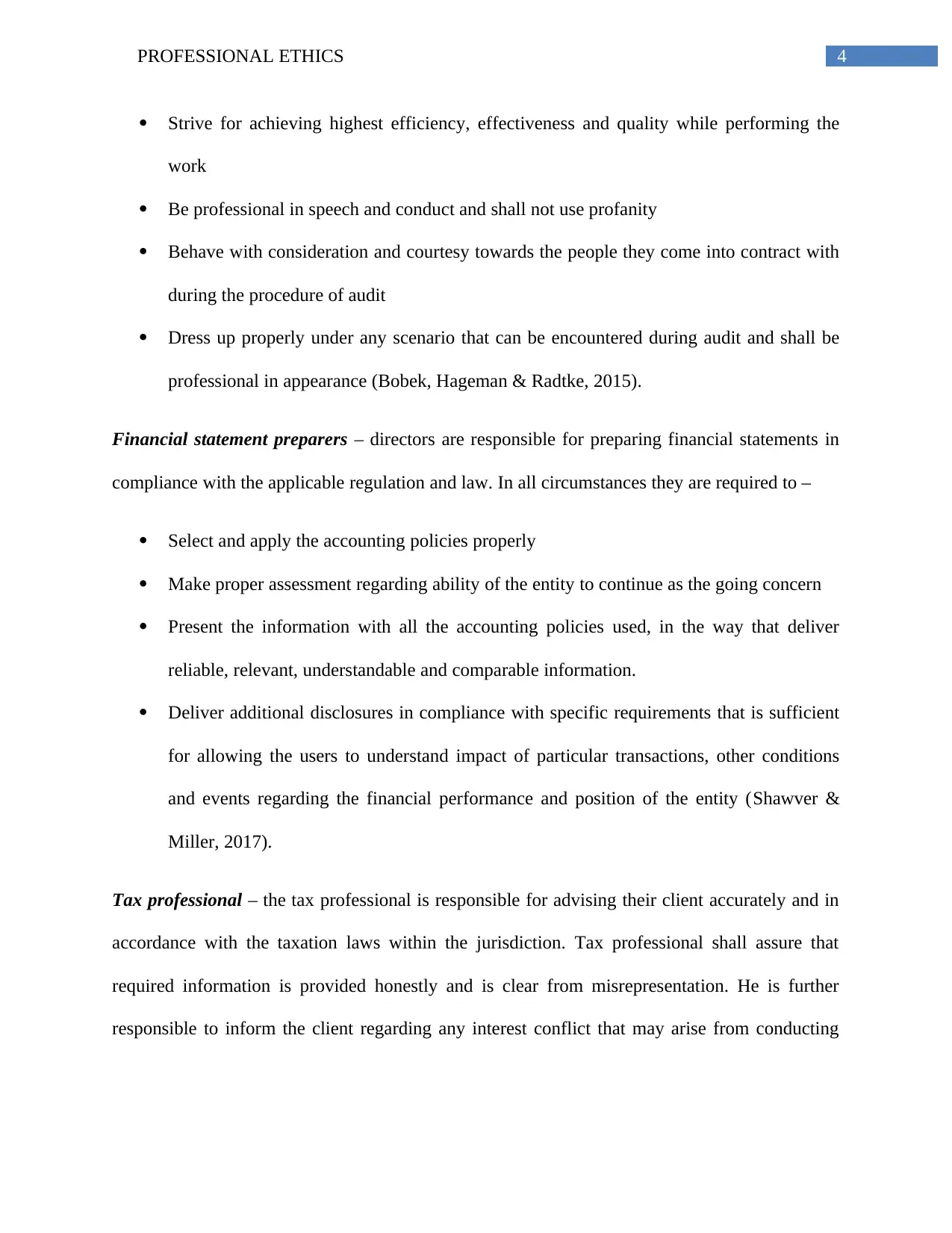
4PROFESSIONAL ETHICS
Strive for achieving highest efficiency, effectiveness and quality while performing the
work
Be professional in speech and conduct and shall not use profanity
Behave with consideration and courtesy towards the people they come into contract with
during the procedure of audit
Dress up properly under any scenario that can be encountered during audit and shall be
professional in appearance (Bobek, Hageman & Radtke, 2015).
Financial statement preparers – directors are responsible for preparing financial statements in
compliance with the applicable regulation and law. In all circumstances they are required to –
Select and apply the accounting policies properly
Make proper assessment regarding ability of the entity to continue as the going concern
Present the information with all the accounting policies used, in the way that deliver
reliable, relevant, understandable and comparable information.
Deliver additional disclosures in compliance with specific requirements that is sufficient
for allowing the users to understand impact of particular transactions, other conditions
and events regarding the financial performance and position of the entity (Shawver &
Miller, 2017).
Tax professional – the tax professional is responsible for advising their client accurately and in
accordance with the taxation laws within the jurisdiction. Tax professional shall assure that
required information is provided honestly and is clear from misrepresentation. He is further
responsible to inform the client regarding any interest conflict that may arise from conducting
Strive for achieving highest efficiency, effectiveness and quality while performing the
work
Be professional in speech and conduct and shall not use profanity
Behave with consideration and courtesy towards the people they come into contract with
during the procedure of audit
Dress up properly under any scenario that can be encountered during audit and shall be
professional in appearance (Bobek, Hageman & Radtke, 2015).
Financial statement preparers – directors are responsible for preparing financial statements in
compliance with the applicable regulation and law. In all circumstances they are required to –
Select and apply the accounting policies properly
Make proper assessment regarding ability of the entity to continue as the going concern
Present the information with all the accounting policies used, in the way that deliver
reliable, relevant, understandable and comparable information.
Deliver additional disclosures in compliance with specific requirements that is sufficient
for allowing the users to understand impact of particular transactions, other conditions
and events regarding the financial performance and position of the entity (Shawver &
Miller, 2017).
Tax professional – the tax professional is responsible for advising their client accurately and in
accordance with the taxation laws within the jurisdiction. Tax professional shall assure that
required information is provided honestly and is clear from misrepresentation. He is further
responsible to inform the client regarding any interest conflict that may arise from conducting
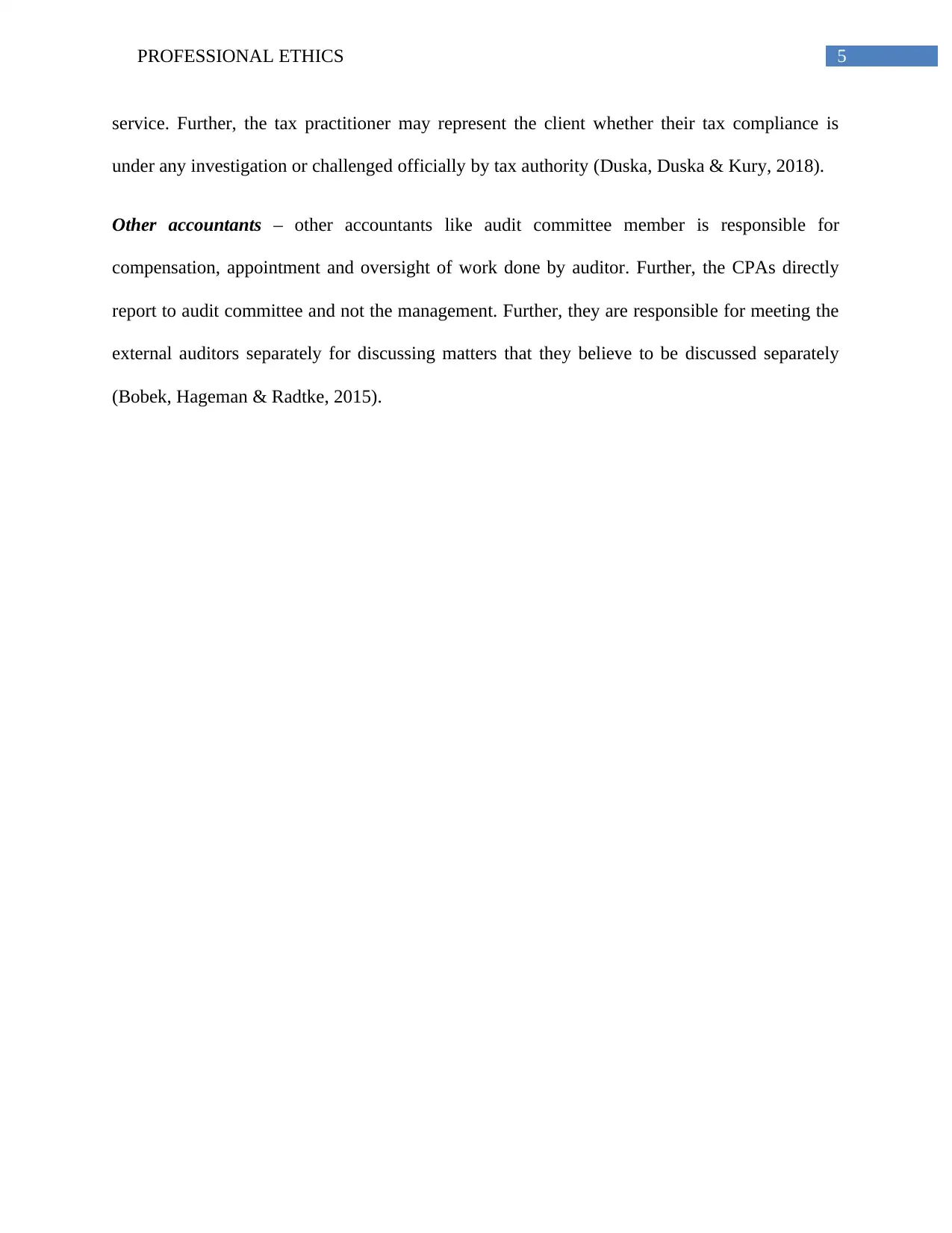
5PROFESSIONAL ETHICS
service. Further, the tax practitioner may represent the client whether their tax compliance is
under any investigation or challenged officially by tax authority (Duska, Duska & Kury, 2018).
Other accountants – other accountants like audit committee member is responsible for
compensation, appointment and oversight of work done by auditor. Further, the CPAs directly
report to audit committee and not the management. Further, they are responsible for meeting the
external auditors separately for discussing matters that they believe to be discussed separately
(Bobek, Hageman & Radtke, 2015).
service. Further, the tax practitioner may represent the client whether their tax compliance is
under any investigation or challenged officially by tax authority (Duska, Duska & Kury, 2018).
Other accountants – other accountants like audit committee member is responsible for
compensation, appointment and oversight of work done by auditor. Further, the CPAs directly
report to audit committee and not the management. Further, they are responsible for meeting the
external auditors separately for discussing matters that they believe to be discussed separately
(Bobek, Hageman & Radtke, 2015).
⊘ This is a preview!⊘
Do you want full access?
Subscribe today to unlock all pages.

Trusted by 1+ million students worldwide
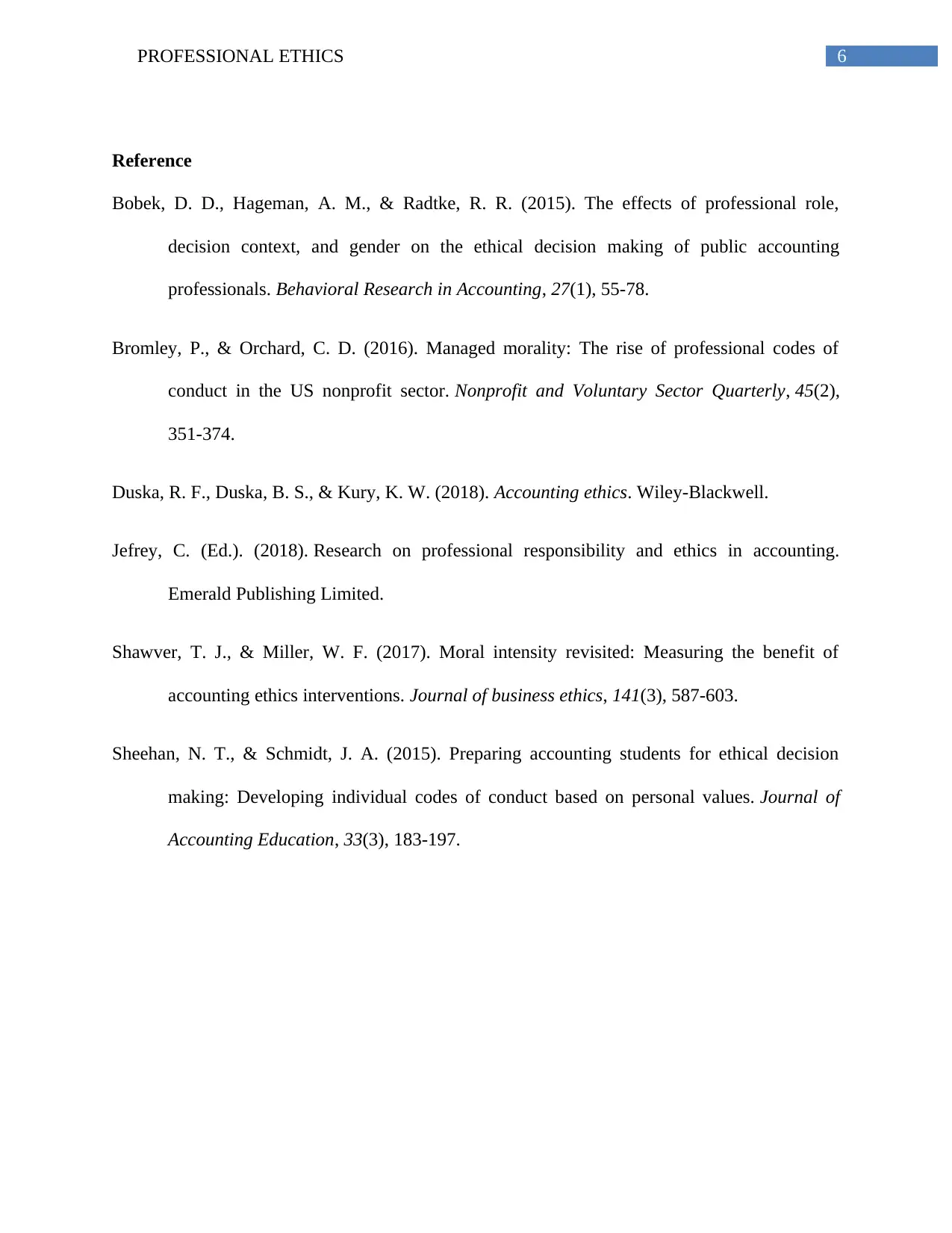
6PROFESSIONAL ETHICS
Reference
Bobek, D. D., Hageman, A. M., & Radtke, R. R. (2015). The effects of professional role,
decision context, and gender on the ethical decision making of public accounting
professionals. Behavioral Research in Accounting, 27(1), 55-78.
Bromley, P., & Orchard, C. D. (2016). Managed morality: The rise of professional codes of
conduct in the US nonprofit sector. Nonprofit and Voluntary Sector Quarterly, 45(2),
351-374.
Duska, R. F., Duska, B. S., & Kury, K. W. (2018). Accounting ethics. Wiley-Blackwell.
Jefrey, C. (Ed.). (2018). Research on professional responsibility and ethics in accounting.
Emerald Publishing Limited.
Shawver, T. J., & Miller, W. F. (2017). Moral intensity revisited: Measuring the benefit of
accounting ethics interventions. Journal of business ethics, 141(3), 587-603.
Sheehan, N. T., & Schmidt, J. A. (2015). Preparing accounting students for ethical decision
making: Developing individual codes of conduct based on personal values. Journal of
Accounting Education, 33(3), 183-197.
Reference
Bobek, D. D., Hageman, A. M., & Radtke, R. R. (2015). The effects of professional role,
decision context, and gender on the ethical decision making of public accounting
professionals. Behavioral Research in Accounting, 27(1), 55-78.
Bromley, P., & Orchard, C. D. (2016). Managed morality: The rise of professional codes of
conduct in the US nonprofit sector. Nonprofit and Voluntary Sector Quarterly, 45(2),
351-374.
Duska, R. F., Duska, B. S., & Kury, K. W. (2018). Accounting ethics. Wiley-Blackwell.
Jefrey, C. (Ed.). (2018). Research on professional responsibility and ethics in accounting.
Emerald Publishing Limited.
Shawver, T. J., & Miller, W. F. (2017). Moral intensity revisited: Measuring the benefit of
accounting ethics interventions. Journal of business ethics, 141(3), 587-603.
Sheehan, N. T., & Schmidt, J. A. (2015). Preparing accounting students for ethical decision
making: Developing individual codes of conduct based on personal values. Journal of
Accounting Education, 33(3), 183-197.
1 out of 7
Related Documents
Your All-in-One AI-Powered Toolkit for Academic Success.
+13062052269
info@desklib.com
Available 24*7 on WhatsApp / Email
![[object Object]](/_next/static/media/star-bottom.7253800d.svg)
Unlock your academic potential
Copyright © 2020–2026 A2Z Services. All Rights Reserved. Developed and managed by ZUCOL.





